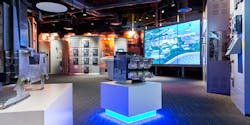Maryrose Sylvester spent 31 years at GE, and during her tenure there served as president and/or CEO of four different businesses—Industrial Automation, Specialty Materials, GE Lighting and most recently, GE Current, its smart lighting business that was sold in 2018.
Sylvester watched as an interested bystander as ABB announced its $2.6 billion acquisition of GE’s underperforming Industrial Solutions business in late 2017. In June 2019, she joined ABB as the president of its U.S. electrification business.
That acquisition doubled ABB’s industrial electrification coverage in the U.S., giving it foothold in the low-voltage market for power solutions—which it had previously been lacking because of differing electrical specifications in the U.S. vs. the rest of the world.
In the past, ABB leaders "would get very sad walking through these factories, past all the electrical equipment we could never compete for,” she says
In an interview with IndustryWeek earlier this winter at ABB’s Centre of Excellence in Bergamo, Italy, Sylvester shared her vision for the U.S. market.
Maryrose Sylvester
What are your priorities for electrification in the U.S.?
We’ve been doing a lot of specification work getting our message out on our capabilities. So that is number one.
Number two is starting to seed the market around the digital opportunity we've got. You've seen the digital platform that we have and some of the value. We're trying to make sure customers are associating us with their digital needs and how we help them with asset management, energy management, building management.
I'm out getting to know all of our distribution partners as part of my new role. I know many of them from my old role, but I want to make sure I get their perspective on ABB and what they think we're good at and what we need to work on and that they understand ABB's commitment to the U.S. market. Which is new because a lot of the market we couldn't participate in before. I want them to understand how important this market is to us and why we're in it to help them win.
What are your strengths vs. your competitors?
From the ABB side, which is technology—we’re definitely taking a lot of good ideas that come from ABB's global reach. And from the GE side, it would be a strong heritage of supporting distribution, a strong heritage of supporting the industry. GE was the market leader in the space many years ago. So there’s a lot of trust in the overall strength of the franchise. But now I would say there’s a lot of appreciation for ABB stepping in and being able to take the market forward.
The wins have come in pretty quick order because the market was hungry for GE find the right buyer.
Where do you see the opportunity?
I think Industrial Solutions has always been strong with contractors, very strong through distribution, but they needed to see a refresh in the technology. So some of them were waiting patiently. Some work couldn't wait patiently any longer. So there was an opportunity to re-solidify a relationship with contractors and distribution with the technology investments we're making. So I think that's number one, is shoring up the customer as we have past and present, make sure they know where we are, where we're going and that we're there to support them.
Number two would be with customers that ABB could never touch on low voltage and GE never had. Just new customers who need to understand what we've got. And so it's just a lot of market education. And that would be the industrial segment, right, where GE was never strong with industrial end users and ABB never had an offering.
What’s the learning curve with your customers on this shift from GE to ABB?
it's very strategically sensible. It just takes time. Because we're bringing new technology. We have to get it specified they need to test it in many cases. So it's just the time, the pacing of it. I think that is probably the most challenging, but we're moving very quickly. Right. And the fact that you saw it, we're not running it as GE. Industrial Solutions anymore. We're running it as part of the ABB Family. So through our different product lines. So the good news for our customers is their front end doesn't change at all. It's a shared front end. So if we had a customer in the U.S. that was a GE customer, it's the same go-to-market approach, which is very good for the customer.
But the the engineers now are lined up by their area of expertise, breakers, gear, etc. So I think that gives them a lot of hope that there's a lot of expertise from the technical side being infused into the traditional GE platform.
What are your priorities for upgrading US plants?
We've now announced over $100 million of investments in U.S. manufacturing here just in the last year. We've announced the expansion of Senatobia (Missippi $36M) in the spring. It will be done right. So we doubled the size of it and so I think March, April the ribbon cuttings will be coming very soon. And we've announced Mebane (North Carolina, $39.9M) expansion, which was a long term GE site. And it's going to become another Center of Excellence for us. We're going to see an incorporation of renewables into these sites, trying to use our own technology in our own sites and prove out our value propositions.
What about reskilling U.S. workers?
It's a huge priority for us in the U.S. We have very strong sites in these places, and we're really investing in retraining and making sure we're giving people the opportunity for retraining and making we’ve got the right set of skills. ABB has a very interesting apprenticeship program that we started out in Fort Smith [Arkansas]. I had a chance to visit it this summer. We modeled it after what's going on in our home country, Switzerland, in terms of the importance of building talent, getting people right out of high school into technical schools, helping them understand why manufacturing is so important, getting them in their summer months to learn about manufacturing and get them hooked on opportunities manufacturing provides for their future. Teaching them obviously technology and spreadsheeting and Six Sigma. Problem solving. It is fascinating to seem learn that so early [in their education]. We're trying to take that more broadly across the country.
What sort of education do you have to do with customers in the U.S.?
I think the good news is people need electrification. Our customers take these decisions very seriously. They have very qualified people looking at the future of their energy supply, their electricity demands and making sure they're very forward thinking in terms of, you know, keeping up with their capacity demands.
It can be a big source of productivity for a business to have the right electrical system. And so they often come to us looking for new areas of innovation. Our EDCS (Electrical Distribution Control System) product lets them go in and actually have a device that communicates and can feed information to the cloud at the same time they're upgrading their electrical system. So it kind of gives them incremental value. It lets them also digitize their operation. I think that's another selling feature. We have to go out and tell that story. You have to work with customers that really have an inkling to transform their operations to get more value out of their assets through digitization.
Coming to ABB and working with these legacy U.S. plants, were there any culture changes that you had to make?
ABB has historically been so focused on manufacturing expertise and and automating manufacturing that we moved as quickly on the manufacturing capability and upskilling and upgrading as we did on the commercial front. Like, it was, “Don't take [manufacturing] for granted. This is who ABB is.” We're excellent at technology, we’re excellent at manufacturing. Let's make sure our new assets are as good as the rest of ABB and now we're spending $800 million to do that.
I think a spotlight will shine very early on in manufacturing. “You're part of the process. Help us improve. What do you need? What will make your jobs easier? What will make us easier to do business with? What will make our products better, which will make us more reliable?”
One of things ABB does really well is it has these lighthouse factories that become best in class that we train from the top down, and they kind of evangelize it around the world. So a lot of people from Europe are coming to the U.S. to help us upgrade our sites.
About the Author

Laura Putre
Senior Editor, IndustryWeek
As senior editor, Laura Putre works with IndustryWeek's editorial contributors and reports on leadership and the automotive industry as they relate to manufacturing. She joined IndustryWeek in 2015 as a staff writer covering workforce issues.
Prior to IndustryWeek, Laura reported on the healthcare industry and covered local news. She was the editor of the Chicago Journal and a staff writer for Cleveland Scene. Her national bylines include The Guardian, Slate, Pacific-Standard and The Root.
Laura was a National Press Foundation fellow in 2022.
Got a story idea? Reach out to Laura at [email protected]

